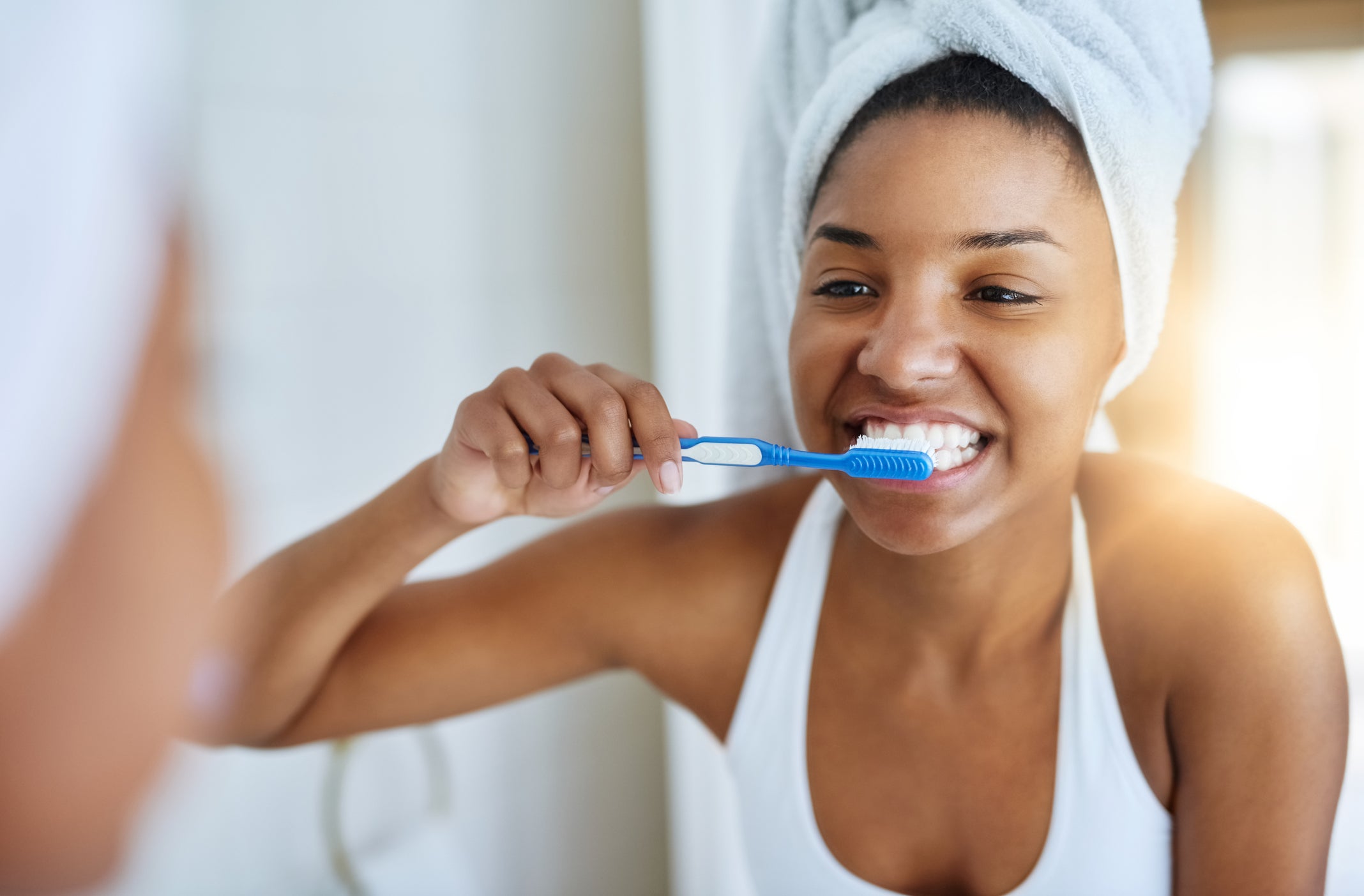-
10 Ways Stress Can Impact Your Teeth

You know that stress can manifest as a headache, muscle tension, or high blood pressure, but have you ever considered how stress can impact your teeth? Here are 10 of the most commonly reported dental health issues linked to stress.
- Tooth grinding: Also known as bruxism, nighttime tooth grinding is a common condition, especially among stressed individuals. The unconscious habit wears down your teeth over time and may also cause tooth shifting and jaw pain.
- Tooth fractures: Teeth have tiny fissures in them due to everyday wear and tear. As long as they don’t become any worse, these fissures are no problem. Unfortunately, jaw clenching and stress go hand-in-hand, causing weak teeth to eventually fracture and break.
- Sensitivity: Nighttime grinding and daytime clenching can wear down the protective enamel layer, leaving your teeth more sensitive to hot and cold temperatures and sweet and sour foods.
- Temporomandibular joint (TMJ) pain: The TMJ is the joint connecting each side of your jaw to your skull. Pain or dysfunction in this joint is known as temporomandibular joint disorder, or TMD. Stress-related tooth grinding, jaw clenching, and muscle tension may cause or aggravate TMD.
- Gum disease: Some studies suggest a link between the stress hormone cortisol and bacterial growth that leads to gum disease, also called periodontal disease. This chronic oral health problem can cause gum sensitivity, bad breath, and eventually tooth loss.
- Cold sores: Also called fever blisters, cold sores are caused by the herpes simplex virus. Being upset or stressed can trigger an outbreak at the corners of your mouth, which may take a week or more to clear up.
- Canker sores: These painful mouth sores make it difficult to eat spicy, salty, or acidic foods. Experts aren’t sure what causes canker sores, also called recurrent aphthous stomatitis (RAS), but it appears that stress increases your risk.
- Oral infections: Stress negatively impacts your immune system, making you more vulnerable to low-grade infections in your mouth and elsewhere in your body.
- Dry mouth: Formally known as xerostomia, dry mouth is when your salivary glands fail to produce enough saliva. Among other causes, stress and anxiety have been shown to decrease saliva production, causing dry mouth.
- Bad oral health habits: Stressed-out people are often exhausted or pressed for time, making them more likely to neglect their oral health, as well as rely on cigarettes, alcohol, and unhealthy comfort food. All of these habits increase the risk of cavities, gum disease, and other concerns.
Don’t allow stress to wreak havoc on your dental health! Instead, take steps in your daily life to reduce anxiety, such as meditating, doing yoga, and working on your time management skills. Then, fit dentist visits into your busy schedule to keep on top of oral health problems as they arise. To work with the best dentist in New York, contact Park 56 Dental at (212) 826-2322. We have served patients in the 10022 zip code area for over 20 years.
-
What to Expect During Your First Visit to Park 56 Dental

At Park 56 Dental, we are committed to providing our patients with safe, gentle, high-quality dental care. We understand that you or your child may feel apprehensive about your first visit to our office. That’s why we’ll do everything we can to not only make you feel comfortable but truly pampered during your time with us. Here’s what to expect when you visit Park 56 Dental in NYC for the first time.
Review Your Dental & Medical History
Our first goal during your dental consultation is to understand your health. We will review any records you have from previous dentists, along with the patient information form we ask you to complete. Be sure to provide as much information as possible to accurately convey your health status.
Also, don’t forget to bring your insurance card so you can take advantage of your dental benefits when paying for services. This is also a good time to discuss any dental anxiety you have. Sedation dentistry could be a good option for you, depending on your needs.
Take Digital X-Rays
The next step is to have a closer look at your teeth and gums by taking X-rays. The digital imaging technology we use decreases radiation exposure by 90%, ensuring your safety while also making images available for immediate review. Your X-rays serve as a baseline for your current dental health and help us recommend immediate and long-term treatment options.
Clean and Polish Your Teeth
With digital imaging complete, it’s time to clean your teeth. Here’s what this entails:
- Physical exam: A dental hygienist checks your teeth and gums for signs of gingivitis. If major problems are detected, the hygienist might call in the dentist to make sure it’s okay to proceed with the cleaning.
- Plaque and tartar removal: Using a small mirror to check all surfaces, your hygienist removes plaque and tartar buildup from your teeth. This may involve scraping and spraying your teeth with a high-pressure water jet.
- Polishing: The hygienist polishes and removes stains from your teeth using a gritty paste.
- Flossing and rinsing: The hygienist touches up your smile by flossing and rinsing with water.
- Fluoride treatment: An optional fluoride gel at the end of your cleaning helps protect your teeth against cavities until your next dentist appointment.
Meet with the Dentist
Following a comprehensive teeth cleaning, your dentist will sit down with you to review the findings and discuss any immediate treatment needs. This is your chance to ask questions and discuss any cosmetic dentistry services you’re interested in, including veneers, tooth reshaping, whitening, and more.
Everyone’s busy, but regular dental checkups are an important part of maintaining a healthy smile! In fact, the American Dental Association recommends visiting the dentist every six months. If it’s been longer than this since your last visit, contact Park 56 Dental at (212) 826-2322 to schedule your first appointment with NYC’s best dentist. We have over 20 years of experience serving patients in the 10022 zip code area.
-
The Best and Worst Thanksgiving Foods for Your Teeth

When you go to plan your Thanksgiving dinner menu, how do you decide what to serve? Most people opt for traditional family favorites, perhaps with a new dish or two to try. But if you or someone in your family is struggling with oral health issues, it may be wise to choose foods based on how good they are for your teeth and gums. Here are some of the best and worst foods to eat for Thanksgiving if you’re focused on good oral health.
Limit These Worst Thanksgiving Foods for Your Teeth
- Stuffing and rolls: They may be Thanksgiving staples, but the sugary carbohydrates in stuffing and rolls feed the bacteria in your mouth. The acids left behind can then erode your teeth and lead to cavities.
- Cranberry sauce: Loaded with sugar and tooth-staining berries, cranberry sauce is known to discolor enamel and encourage cavities to form.
- Pies and desserts: Most people enjoy a slice of pumpkin or pecan pie and other desserts after Thanksgiving dinner. Keep in mind that sugar turns into acid in your mouth, making it your teeth’s worst enemy.
- Caramel corn: Popcorn is bad enough, but cover it with sticky caramel, and you have a recipe for dislodged crowns and lost fillings.
- Alcohol: The acid in wine is enough to etch your teeth if you drink it too often, so be wise about your alcohol consumption this Thanksgiving.
If you must indulge in these Thanksgiving foods, do so sparingly. Then, to remove particles from your mouth, rinse with water throughout the meal and brush your teeth 30 minutes after your last bite.
Eat More of These Best Thanksgiving Foods for Your Teeth
- Turkey: Good news—the quintessential Thanksgiving food is perfectly fine for your teeth! Turkey doesn’t contain starch or sugar that can harm your oral health, and it’s also an excellent source of vitamin D and protein to support a healthy smile.
- Vegetables: Carrots, celery, cucumbers, and tomatoes are a healthy addition to your Thanksgiving feast. Veggies are chockfull of vitamins and nutrients that promote good oral health. The act of chewing them also scrubs your teeth, massages your gums, and stimulates saliva flow.
- Sweet potatoes: Feel free to load your plate with sweet potatoes because they’re high in potassium, dietary fiber, and vitamin B6. Just be careful about the brown sugar or marshmallows often served with them.
- Cheese and nuts: Munch on these snacks guilt-free, knowing they’re filled with calcium, protein, and other nutrients your teeth need to stay healthy and strong.
If you notice stained, yellowed, or aching teeth around the holidays, don’t put off visiting the dentist. A trip to Park 56 Dental will leave your teeth feeling cleaner and brighter. Voted NYC’s best dentist, we are well-equipped to meet all your preventative and restorative dentistry needs. Give us a call at (212) 826-2322 to set up an appointment today! We have been serving patients in the 10022 zip code area since 1997.
-
How to Reverse Cavities

No one wants to hear their dentist say, “You have a cavity.” The key to good oral health and a cavity-free mouth is to understand why cavities form so you can take steps to prevent and reverse them.
What Causes Cavities?
Cavities are the result of untreated tooth decay, which occurs when your teeth are repeatedly exposed to acid and bacteria. Your diet and oral care routine play a significant role in the formation of cavities. When you eat sugary or starchy foods, a sticky substance called plaque forms on your teeth. The bacteria in your mouth feed on this plaque, producing acid as a waste product. This acid then eats away at your teeth.
Tooth decay occurs in five stages:
- Demineralization: Your teeth lose and regain minerals all day long. The problem occurs when depleted minerals are not restored.
- Enamel decay: The outer layer of your teeth decays first.
- Dentin decay: As the problem spreads to the dentin layer, you may start to feel pain.
- Pulp decay: Pain and inflammation can become severe if decay reaches the inner pulp of your teeth.
- Abscesses: When bacteria inside a cavity spread beneath the pulp, a pocket of pus can form, causing a painful abscess.
Signs of Cavities
Watch out for these signs that your teeth are starting to decay:
- White spots on your teeth (a sign of mineral loss)
- Grey, black, or brown spots on your teeth (a sign of decay)
- Toothaches
- Painful chewing
- Sensitivity to hot, cold, or sweet substances
- Pits or holes in your teeth (detectable through an X-ray)
How to Prevent and Reverse Cavities
By the time a cavity is noticeable, it may be too late to reverse the damage naturally. However, with the proper care, you can prevent cavities and even help early tooth decay heal on its own. Here’s what to do:
- Improve your nutrition: Replace sugary, starchy, and acidic foods with those rich in calcium, vitamins B and D, magnesium, and iron.
- Keep up your oral care routine: Remove bacteria-feeding plaque from your mouth by brushing your teeth morning and night, flossing at least once a day, and rinsing with mouthwash.
- Remineralize your teeth: Fluoride is the key to preventing mineral loss and replacing lost minerals. You can get fluoride from toothpaste, mouthwash, tap water, prescription fluoride tablets, and in-office fluoride treatments.
- Visit the dentist every six months: Dentists help prevent cavities by providing routine checkups and cleanings. They can also reverse cavities with fillings, crowns, root canals, and implants. These dental restorations are usually covered by insurance.
To keep your mouth cavity-free, be sure to visit Park 56 Dental, the best dentist in New York. We have more than 20 years of experience pampering our patients in a spa-like setting. For more oral care tips or to schedule a free consultation with our NYC dentist, please call us at (212) 826-2322 or contact us online.
RECENT POSTS
categories
- Uncategorized
- Cosmetic Dentistry
- Veneers
- Healthier Teeth
- Teeth Whitening
- Dental Health
- Video
- Dental Emergencies
- Invisalign
- Dental Implants
- Root Canal
- Sedation Dentistry
- Infographic
- Dental Crowns and Bridges
- Dental Anxiety
- Gum Disease
- COVID-19
- Bad Breath
- New York Dentist
- Cut out sugar
- General Dentistry
- Oral Health
- Oral Cancer
- Dry Mouth
- Gum Health
- Toothache
- Dental Sealants
- Cavities
